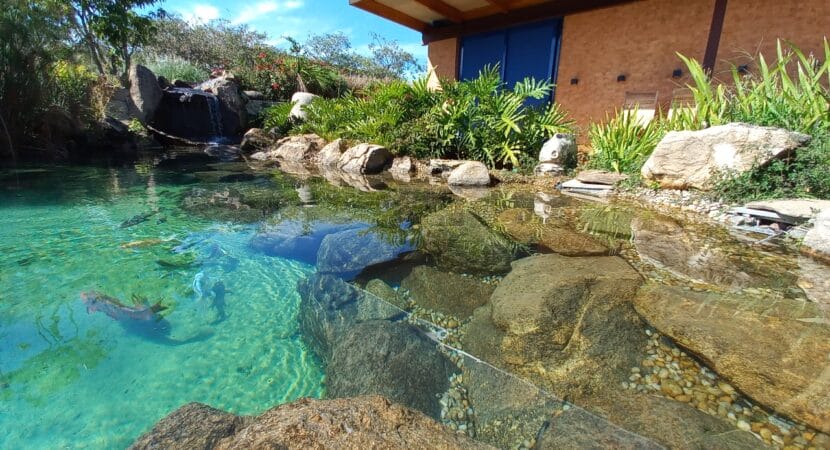
Ecological innovation in leisure areas
Biological pools emerge as a revolutionary trend in Brazil, combining sustainability, natural beauty and lower environmental impact. These pools, which incorporate sand, fish, plants and stones, consume up to 70% less water and emit less CO2 compared to traditional pools. The absence of cement and steel structures in biological pools contributes significantly to reducing the carbon footprint, attracting more and more fans across the country.
Technology and harmony with nature
Biological pools are distinguished by their innovative use of filtration systems, including biological filters that employ microorganisms to purify the water. In this artificial ecosystem, fish play a vital role in controlling algae and mosquito larvae, simulating the dynamics of natural ecosystems. This approach allows swimming pools to remain clean without the use of chlorine or other chemicals, using only ozone as a disinfectant, which is a thousand times more effective than chlorine and does not harm human health.
Health and connection with nature
Biologist Rafael Catarino, founder of Clímax Ambiental, highlights that biological pools offer a unique opportunity to reconnect with natural cycles. According to him, diving into a biological pool can have a relaxing effect similar to “forest bathing”, beneficial for both the mind and body. Demand for these pools skyrocketed after the pandemic, highlighting people's growing interest in integrating nature and sustainability into their residential spaces.
Environmental education for new generations
Biological pools also prove to be excellent educational tools, especially for children. Interacting with fish, birds, frogs, insects and plants provides a deeper understanding of natural cycles, as well as offering a healthy and fun alternative to electronic games and television. Catarino highlights the importance of maintaining the ecological balance of these pools, carefully selecting fish species and controlling the use of ozone so as not to harm the aquatic inhabitants.
Sustainability and Maintenance
If well designed and maintained, biological pools can be less labor intensive than conventional ones, in addition to offering additional benefits. For example, water rich in organic matter, resulting from cleaning filters, can be used to fertigate gardens, saving money on organic fertilizers and reducing waste production.
Environmental impact and multiplied benefits
The trend towards biological pools reflects a greater movement towards sustainability and respect for the environment. In addition to offering a unique leisure space connected with nature, these pools contribute to reducing water consumption and CO2 emissions, perfectly aligning with the principles of a more ecological and responsible life.
Conclusion: a dive into sustainability
Biological pools represent much more than a simple alternative to conventional pools. They are an expression of a conscious lifestyle, which values harmony with the environment and promotes health and well-being. With the growing demand for these swimming pools in Brazil, they are established as an intelligent and sustainable choice for contemporary leisure.
Source: João Manuel.












